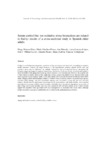Serum cortisol but not oxidative stress biomarkers are related to frailty: results of a cross-sectional study in Spanish older adults

Use this link to cite
http://hdl.handle.net/2183/26182Collections
- Investigación (FCS) [1293]
Metadata
Show full item recordTitle
Serum cortisol but not oxidative stress biomarkers are related to frailty: results of a cross-sectional study in Spanish older adultsAuthor(s)
Date
2019-08-13Citation
Marcos-Pérez D, Sánchez-Flores M, Maseda A, Lorenzo-López L, Millán-Calenti JC, Pásaro E, Laffon B, Valdiglesias V. Serum cortisol but not oxidative stress biomarkers are related to frailty: results of a cross-sectional study in Spanish older adults. J Toxicol Environ Health A. 2019;82(14):815-825.
Abstract
[Abstract] Frailty is a multidimensional geriatric syndrome of loss of reserves and increased vulnerability to negative health outcomes. Cortisol, the major hormone of the hypothalamic pituitary adrenal (HPA) axis, and oxidative stress may be influenced by multiple endogenous and environmental factors throughout the lifespan, triggering changes in organism functioning. Association of elevated levels of cortisol and oxidative stress biomarkers with aging and several age-related diseases is well documented. However, the possible role of these factors on frailty status in older adults has not been extensively studied. Hence, the aim of this study was to conduct a cross-sectional study in 252 older adults (≥65 years old) classified according to their frailty status. Plasma cortisol and biomarkers related to oxidative stress including reactive oxygen/nitrogen species, oxidative DNA damage, and total antioxidant capacity were determined in non-frail, pre-frail, and frail subjects. Results showed significantly increasing cortisol concentrations with frailty burden, but no marked association between any oxidative stress biomarker and frailty status. In addition, dependence on activities of daily living and 10-year mortality risk were also correlated with elevated cortisol levels. Current results support the hypothesis that age-related HPA axis dysregulation is associated with frailty status, although further research is necessary to establish the role of cortisol in the pathophysiology of frailty.
Keywords
Aging
Antioxidant capacity
Cortisol
Frailty
Oxidative stress
Antioxidant capacity
Cortisol
Frailty
Oxidative stress
Editor version
ISSN
1528-7394





